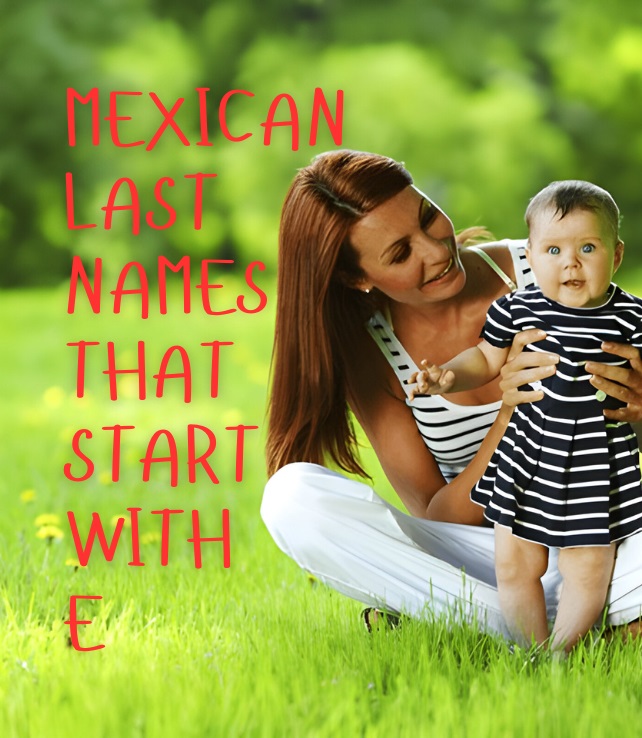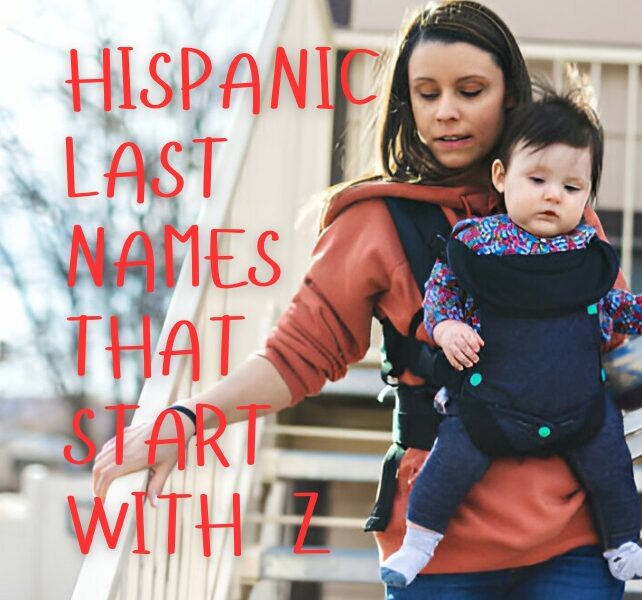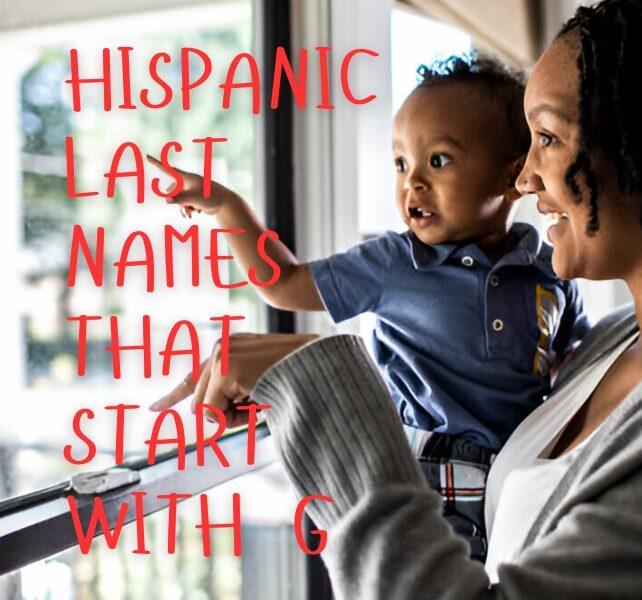Last Updated on January 2, 2025 by Emma
Exploring the rich tapestry of Mexican last names that begin with the letter ‘E’ offers a fascinating glimpse into the culture and history of Mexico. These surnames reflect the heritage and ancestral ties of individuals and embody stories of migration, occupation, and transformation. This curated list provides insights into 100 unique Mexican last names starting with ‘E’, each carrying its own unique story and significance. By delving into these names, we connect more deeply with the roots and the diverse linguistic influences that shape Mexican identity.
100 Mexican Last Names That Start with E
In Mexico, surnames starting with the letter ‘E’ often trace their origins to Spanish, indigenous languages, and even other European influences. This selection offers a window into the etymology and the broader cultural backgrounds that these names represent. Below, you will find a detailed table listing 100 Mexican last names beginning with ‘E’, accompanied by the meanings or origins of each surname. This exploration not only enriches our understanding of Mexican culture but also celebrates the diversity embedded within it.
| Last Name | Meaning/Origin |
|---|---|
| Escobar | From the Spanish for ‘thicket’ or ‘bush’, indicating a place of origin |
| Espinoza | Derived from ‘espino’, meaning ‘thorn bush’, suggesting a spiky character or landscape |
| Estrada | Means ‘road’ or ‘pathway’ in Spanish, indicating a familial origin near a notable road |
| Esparza | From a Basque word meaning ‘abundance of spart grass’ |
| Escalante | From the verb ‘escalar’, meaning ‘to climb’, possibly indicating a highlander ancestor |
| Enriquez | Patronomic surname meaning ‘son of Enrique’ |
| Esteban | Derived from the given name Stephen, meaning ‘crown’ or ‘wreath’ |
| Escudero | From the Spanish for ‘squire’, indicating a person who was a servant of a knight |
| Espinal | Relating to ‘spine’ or ‘backbone’, possibly topographical |
| Escalona | Originates from a place name in Spain, meaning ‘ladder’ or ‘scaling’ |
| Esquivel | Possibly related to ‘esquivar’, meaning ‘to dodge’, suggesting an elusive ancestor |
| Estrella | Meaning ‘star’, possibly denoting someone who lived near a star-shaped landmark |
| Escoto | Derives from ‘Scot’, indicating Scottish descent or connection |
| Espejo | Means ‘mirror’, possibly metaphorical for a reflective or thoughtful nature |
| Echevarria | Basque origin, meaning ‘new house’ |
| Elizondo | From Basque ‘eliz’, meaning ‘church’, indicating proximity to a church |
| Encinas | Derived from ‘encina’, a type of oak, suggesting a connection to oak-covered land |
| Escamilla | Unknown origin, possibly a variant of a place name in Spain |
| Evangelista | Means ‘bearer of good news’, likely linked to religious roles |
| Esqueda | Uncertain, possibly a variant of a geographical or occupational term |
| Escareño | Possibly related to ‘escaro’, meaning ‘scar’, perhaps a nickname for a warrior |
| Espitia | Unclear origin, possibly a variant spelling of a Basque surname |
| Espadero | From ‘espada’, meaning ‘sword’, indicating an ancestor who made or sold swords |
| Estevez | Patronomic, ‘son of Esteve’ or Steven, a common Christian name |
| Escalera | Meaning ‘ladder’, could denote a house sign or a builder of ladders |
| Esmeralda | Means ’emerald’, possibly indicating a person of beauty or value |
| Escobedo | Derived from ‘escoba’, meaning ‘broom’, possibly occupational |
| Escolano | Denoting ‘schoolmaster’, an occupational surname |
| Escribano | Meaning ‘scribe’ or ‘clerk’, an occupational name |
| Eslava | Indicates Slavic origins or connections |
| Escorza | Possibly from ‘escorzar’, meaning ‘to peel or strip’, possibly occupational |
| Esparragoza | From ‘espárrago’, meaning ‘asparagus’, could be topographical |
| Espinosa | Similar to Espinoza, referring to a thorn-like character or landscape |
| Escorcia | Variant of Escorza, highlighting etymological nuances |
| Estudillo | Possibly denoting a small study or room, topographical |
| Estrabao | Derived from ‘strabo’, meaning ‘squint-eyed’, possibly a nickname |
| Escolar | Related to ‘school’, could denote someone associated with education |
| Espino | A simplified form of Espinoza, focusing on the ‘thorny’ aspect |
| Estopinan | Possibly geographical, from a place with stopping points or inns |
| Esparraga | Variant of Esparragoza, emphasizing the agricultural connection |
| Espartero | From ‘esparto’, a type of grass, indicating a craftsman who worked with esparto |
| Escobosa | From ‘escoba’, emphasizing a place covered with bushes or brooms |
| Estanga | Basque origin, possibly from a word meaning ‘pond’ or ‘pool’ |
| Estruga | Uncertain, possibly related to a form of the Spanish verb ‘to press or crush’ |
| Escriva | Variant of Escribano, highlighting clerical or administrative roles |
| Estanislao | From the given name Stanislaus, indicating Eastern European connections |
| Esteva | Variant of Estevez, focusing on personal name derivations |
| Escalado | Related to climbing or scaling, possibly indicating a mountaineer or highlander |
| Espadon | Derived from ‘espada’, meaning large sword, could be occupational |
| Escandón | Possibly from ‘escandir’, to scan or scrutinize, suggesting a judicious ancestor |
| Espatulado | From ‘espatula’, meaning spatula; possibly occupational for a builder or mason |
| Esnider | A phonetic variant, possibly indicating foreign roots or adaptation |
| Estanque | Means ‘pond’ or ‘pool’, perhaps denoting a place of origin near water |
| Espeleta | Potentially from a diminutive form of ‘espejo’, meaning small mirror |
| Escarpín | Could be derived from ‘escarpín’, a type of shoe, possibly occupational |
| Espelosín | Unclear origin, possibly a diminutive form indicating smallness or delicacy |
| Escorial | Referring to a place with scorched or burnt landscape |
| Espinar | A variant of Espinosa, emphasizing a place covered with thorny plants |
| Espanillo | Diminutive form of España, possibly denoting someone from Spain |
| Escudilla | Could be from ‘escudilla’, meaning bowl, possibly a potter or craftsman |
| Escotillo | Means ‘small hatch’ on a ship, possibly indicating a sailor or shipbuilder |
| Esperón | From ‘espolón’, meaning spur, perhaps metaphorical for someone who incites or drives others |
| Espolear | Derived from ‘to spur’, could denote a horseman or someone who motivates |
| Estépar | Geographic, possibly from a place named Estépar |
| Escudete | From ‘escudo’, meaning shield; could be occupational for a shield maker |
| Espadero | Focused on a person who makes or sells swords, distinct from Espadero |
| Estereo | Possibly from ‘estéreo’, meaning stereo, hinting at a modern or technological connection |
| Estilado | From ‘estilar’, meaning to style or fashion, possibly indicating a tailor or designer |
| Escota | Related to sailing, from ‘escotar’, meaning to trim a sail |
| Esdras | From the Biblical name Ezra, indicating a religious or scholarly lineage |
| Estivador | Means ‘stevedore’ or dockworker, an occupational surname |
| Espinado | Another variant focusing on thorny or prickly characteristics |
| Estofador | From ‘estofar’, meaning to upholster, suggesting an upholsterer |
| Escondo | Derived from ‘esconder’, meaning to hide, possibly indicating a secretive or stealthy ancestor |
| Espirito | From ‘espírito’, meaning spirit, possibly indicating a spirited or lively individual |
| Escante | Uncertain, possibly from a phonetic adaptation or variant |
| Escarzaga | Unclear, possibly a variant of a topographical or occupational name |
| Escovar | Derived from ‘escovar’, meaning to brush, potentially an occupational surname for a cleaner |
| Estante | Means ‘shelf’ or ‘stand’, could be metaphorical for stability or support |
| Espolón | A different focus on the meaning of ‘spur’, indicating either a horseman or a motivator |
| Escalofrío | Meaning ‘shiver’ or ‘chill’, perhaps metaphorical for someone impactful or stirring |
| Escofina | From ‘escofina’, meaning rasp or file, possibly an occupational surname for a craftsman |
| Espigado | Means ‘slender’ or ‘tall’, possibly a descriptor of an ancestor’s physical traits |
| Espiñeira | A variant spelling focusing on a location with spiny or thorny plants |
| Estambrar | Possibly from ‘estampar’, meaning to stamp or print, potentially an occupational name |
| Espumoso | Means ‘foamy’ or ‘frothy’, could refer to a brewer or someone associated with foamy substances |
| Espantoso | Means ‘terrifying’ or ‘horrible’, potentially a nickname for a fearsome individual |
| Estanador | From ‘estanar’, meaning to tin, an occupational name for someone who works with tin |
| Esquilino | Unclear origin, could be a regional variant or a place name |
| Esparceta | From ‘esparceta’, a type of plant, indicating a herbalist or someone connected to herbal medicine |
| Espátula | From ‘espátula’, meaning spatula, potentially indicating a craftsman or an artist |
| Espaldón | From ‘espalda’, meaning back, possibly a descriptor of physical stature or strength |
| Estambril | Unclear, possibly a variant of a place name or occupational surname |
| Escolante | A variant of Escalante, focusing on climbing or scaling, perhaps indicating a highlander |
| Esquiador | From ‘esquiar’, meaning to ski, possibly indicating a person from a mountainous or snowy region |
| Escarpado | Means ‘steep’ or ‘rugged’, possibly describing an ancestor’s homeland or character |
| Estribor | From ‘starboard’, relating to the right side of a ship, potentially indicating a sailor |
| Estribillo | From ‘estribillo’, meaning chorus or refrain, possibly indicating a musician or singer |
| Espinarde | A variant of Espinar, focusing on a thorny or challenging terrain |
| Espolinar | A combination of ‘espolón’ (spur) and ‘linar’ (flax field), possibly denoting a flax farmer or horseman |
| Estornino | From ‘estornino’, meaning starling, possibly a nickname for a talkative or noisy individual |
| Estozolar | Unclear, potentially a regional or occupational variant |
Conclusion
The array of surnames starting with ‘E’ in Mexico is a testament to the country’s layered history and cultural fusion. These names not only carry the legacy of their bearers but also serve as linguistic markers of past migrations, occupations, and social statuses. By examining these surnames, we deepen our appreciation of Mexican cultural diversity and the stories embedded within each family name. As we continue to explore and understand these surnames, we embrace a fuller narrative of the Mexican people and their rich heritage.




